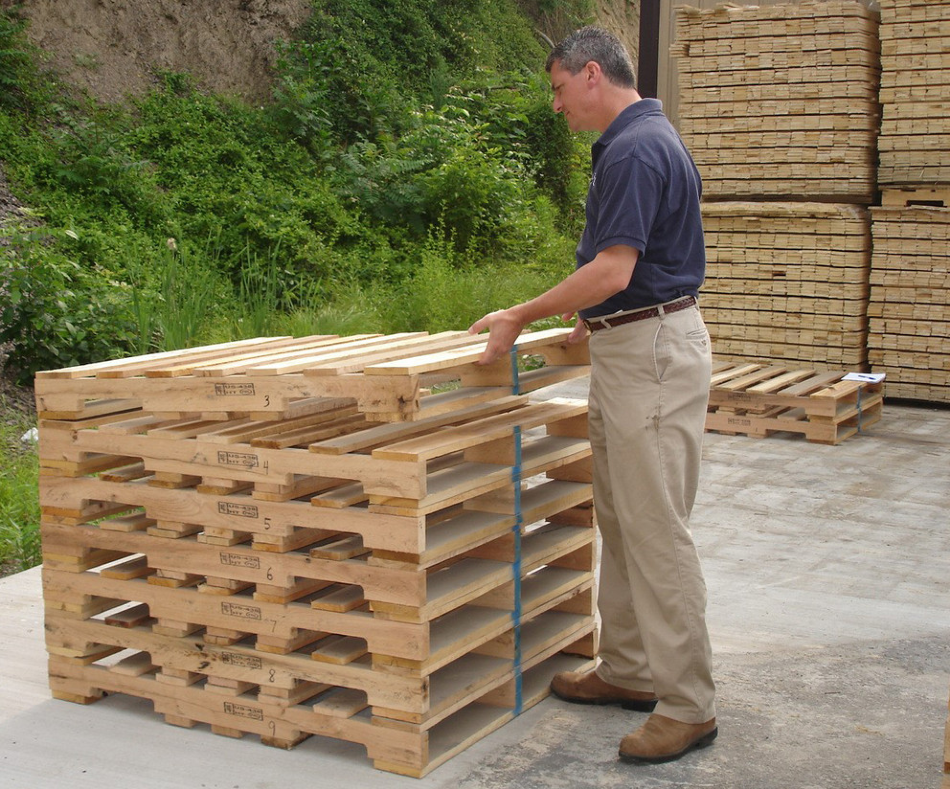Feb 5 2020
Reflecting on a debate that went on for many years, Penn State scientists have reported that wooden shipping pallets are slightly more sustainable and environmentally friendly compared to plastic-based ones. The researchers made this announcement after making a range of highly detailed comparisons.
 Chuck Ray, associate professor of ecosystem science and management, inspects a pile of wooden pallets. He decided to conduct this research after hearing claims about the environmental superiority of plastic pallets that he suspected were questionable. Image Credit: Penn State.
Chuck Ray, associate professor of ecosystem science and management, inspects a pile of wooden pallets. He decided to conduct this research after hearing claims about the environmental superiority of plastic pallets that he suspected were questionable. Image Credit: Penn State.
Few people realize the significance of this issue—there are about 700 million pallets produced and recycled each year in the United States alone. There are 2 billion pallets in use in this country.
Chuck Ray, Associate Professor, Department of Ecosystem Science and Management, College of Agricultural Sciences, Penn State
The long-term performance of the treated plastic pallets and wooden pallets was initially compared through a comprehensive assessment of the cradle-to-grave life cycle. The scientists also performed an analysis of treatments needed to kill insects and other pests. They further examined and assessed the emissions discharged by plastic and wooden pallets across their life cycles and the environmental effects of the resources consumed.
In the latest research, the pallets’ environmental impacts were compared on a one-trip basis as well as on a 100,000-trips basis, under nine impact categories selected by scientists based on their relevance to the environment.
The impact categories comprised respiratory organics, influence on the depletion of the ozone layer, aquatic eutrophication, aquatic acidification, aquatic ecotoxicity, land occupation, terrestrial ecotoxicity, non-renewable energy, and global warming.
In findings recently published in the Journal of Industrial Ecology on February 3rd, 2020, the scientists demonstrated that with respect to the one-trip basis, pallets made of wood, treated with traditional kiln heating, and subjected to as-yet innovative radio-frequency heat treatment incur a total carbon footprint that is somewhat lower than the pallets made of plastic during their life cycle.
The differences are much more significant for the 100,000-trips comparison, the researchers reported.
It should be noted that wooden pallets that are heat-treated to kill pests incur a carbon footprint 20% to 30% lower than those treated with methyl bromide fumigation. Methyl bromide gas has been blamed for depleting the Earth’s ozone layer.
Chuck Ray, Associate Professor, Department of Ecosystem Science and Management, College of Agricultural Sciences, Penn State
Ray continued, “And theoretical calculations of the resource consumption and emissions of radio-frequency treatment of pallets suggest that the new dielectric technology may provide a lower-carbon alternative to both conventionally treated wooden pallets or plastic pallets.”
Generally, a molded plastic pallet has a relatively longer life cycle when compared to a wooden pallet because the former does not usually break down easily or get damaged. Also, molded plastic pallets can travel over 200 round trips before they are removed from service, noted Ray.
Made of strong, toughened material, plastic pallets are built to last for a relatively longer time. However, these pallets are usually obtained from natural gas or petroleum products, which significantly increase their carbon footprint.
“What was lacking in this whole arena was a comprehensive life-cycle analysis, and that is what this study provides,” added Ray. “More than a decade ago, other studies were commissioned by the wood pallet industry and by the plastic pallet industry, and of course those results favored the funders. This is the first academic, peer-reviewed study related to pallets, and it was funded entirely by Penn State and is unbiased.”
With present concerns over climate change, and considering the large number of resources used to make pallets, it is crucial to assess their carbon footprint, according to Ray.
With 40% of all hardwood generated in the United States entering into pallet production, it is important to know if wooden pallets are indeed ecologically sound, he further added.
Because I have worked my whole career in the wood products industry, I have gained a special appreciation for the benefits of wood as an environmentally friendly product. The topic interests me. It did not occur to me to do this research until the plastic pallet industry started talking about their products as environmentally superior. I questioned that statement and decided to do life-cycle analyses.
Chuck Ray, Associate Professor, Department of Ecosystem Science and Management, College of Agricultural Sciences, Penn State
The study also included Sebastian Anil, currently with Microsoft; Junfeng Ma, presently with Mississippi State University; Gul Kremer, currently with Iowa State University; and Shirin Shahidi, a graduate student in the Department of Ecosystem Science and Management when the study was performed.